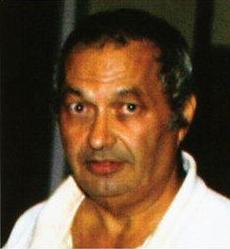Related Research Articles

Industrial espionage, also known as economic espionage, corporate spying, or corporate espionage, is a form of espionage conducted for commercial purposes instead of purely national security.

The Main Directorate of the General Staff of the Armed Forces of the Russian Federation, formerly the Main Intelligence Directorate, and still commonly known by its previous abbreviation GRU, is the foreign military intelligence agency of the General Staff of the Armed Forces of the Russian Federation. The GRU controls the military intelligence service and maintains its own special forces units.

The Foreign Intelligence Service of the Russian Federation or FIS RF is Russia's external intelligence agency, focusing mainly on civilian affairs. The SVR RF succeeded the First Chief Directorate (PGU) of the KGB in December 1991. The SVR has its headquarters in the Yasenevo District of Moscow with its director reporting directly to the President of the Russian Federation.

A dead drop or dead letter box is a method of espionage tradecraft used to pass items or information between two individuals using a secret location. By avoiding direct meetings, individuals can maintain operational security. This method stands in contrast to the live drop, so-called because two persons meet to exchange items or information.
The Lawrence Franklin espionage scandal involved Lawrence Franklin, a former United States Department of Defense employee, passing classified documents regarding United States policy towards Iran to Israel. Franklin pleaded guilty to several espionage-related charges and was sentenced in January 2006 to nearly 13 years of prison, which was later reduced to ten months' house arrest. Franklin passed information to American Israel Public Affairs Committee policy director Steven Rosen and AIPAC senior Iran analyst Keith Weissman, who were fired by AIPAC. They were then indicted for illegally conspiring to gather and disclose classified national security information to Israel. However, prosecutors later dropped all charges against them without any plea bargain.

Noshir Sheriarji Gowadia is a former design engineer and convicted spy for several countries. He was arrested in 2005 and later convicted on industrial espionage-related federal charges.
This page is a timeline of published security lapses in the United States government. These lapses are frequently referenced in congressional and non-governmental oversight. This article does not attempt to capture security vulnerabilities.

John Chris Kiriakou is an American author, journalist and former intelligence officer. Kiriakou is a columnist with Reader Supported News and co-host of Political Misfits on Sputnik Radio.
The American media referred to 1985 as the Year of the Spy because law enforcement arrested many foreign spies operating on American soil. However, the preceding year, 1984, actually had more arrests for espionage in the United States.

Walter Kendall Myers is a former U.S. State Department employee who, with his wife, Gwendolyn Steingraber Myers, was arrested and indicted on June 4, 2009, on charges of spying for Cuba for nearly 30 years. He was convicted of espionage and sentenced to life imprisonment by a U.S. federal court in July 2010.
The Illegals Program was a network of Russian sleeper agents under unofficial cover. An investigation by the Federal Bureau of Investigation (FBI) culminated in the arrest of ten agents on June 27, 2010, and a prisoner exchange between Russia and the United States on July 9, 2010.

Anna Vasilyevna Chapman is a Russian intelligence agent, media personality, and model who was arrested in the United States on 27 June 2010 as part of the Illegals Program, a Russian spy ring. At the time of her arrest, she was accused of espionage on behalf of the Russian Federation's external intelligence agency, the Sluzhba vneshney razvedki (SVR). She had previously gained British citizenship through marriage, which she used to gain residency in the U.S.
Russian espionage in the United States has occurred since at least the Cold War, and likely well before. According to the United States government, by 2007 it had reached Cold War levels.

Mikron Group, headed by JSC Mikron, is the leading developer, manufacturer and exporter of microelectronics in Russia and the CIS. Its main manufacturing facilities are located in Zelenograd, Russia. Other production facilities of the group are located in St.Petersburg and Voronezh. Part of the Element conglomerate.

Evgeny Evgenievich Buryakov is a convicted Russian spy. He was arrested on January 26, 2015, charged with, and pleading guilty to, spying on the United States for the Russian Foreign Intelligence Service (SVR). Buryakov was a New York-based Deputy Representative of Vnesheconombank, Russia's state-owned national development bank. Buryakov operated with non-official cover, and was thus not entitled to diplomatic immunity. Buryakov conducted his espionage with the assistance of Igor Sporyshev, trade representative of the Russian Federation to New York, and Victor Podobnyy, an attaché to the Permanent Mission of the Russian Federation to the United Nations. In exchange for pleading guilty, Buryakov received a reduced sentence of 30 months in federal prison and fined $100,000. He was released early from prison on March 31, 2017, and deported from the United States six days later.

Super Micro Computer, Inc., dba Supermicro, is an American information technology company based in San Jose, California. The company is one of the largest producers of high-performance and high-efficiency servers, while also providing server management software, and storage systems for various markets, including enterprise data centers, cloud computing, artificial intelligence, 5G and edge computing. Supermicro was founded on November 1, 1993, and has manufacturing operations in Silicon Valley, the Netherlands, and in Taiwan at its Science and Technology Park.

Maria Valerievna Butina is a Russian politician, political activist, journalist, and former entrepreneur who was convicted in 2018 of acting as an unregistered foreign agent of Russia within the United States.
Fujian Jinhua Integrated Circuit Co. Ltd., or JHICC, is a Chinese state-owned DRAM manufacturer based in Fujian, China. It is part of the Made in China 2025 program, a component of China's strategy to gain self-sufficiency in the semiconductor industry, and had claimed to be a national leader in China's technology industry.
In the context of the Russo-Ukrainian War, in the time leading up to and after the 2022 Russian invasion of Ukraine, a number of citizens of the Russian Federation and of other nationalities working for Russia have been identified publicly as spies or agents of the Federal Security Service (FSB), the Russia's foreign intelligence service (SVR) or the third intelligence arm, the military intelligence service (GRU). Each arm having their own remits.
References
- 1 2 "Alexander Fishenko, accused of selling hi-tech microelectronics illegally to Russia, due in court". CBS News. Oct 4, 2012.
- 1 2 3 Marzulli, John (October 3, 2012). "U.S. biz man charged as secret agent who shipped electronics from JFK to Russian military". New York Daily News.
- 1 2 3 Lozanno, Juan (Oct 5, 2012). "Alexander Fishenko, Arc Electronics Owner, May Have Sold Tech Secrets To Russian Navy By Pretending To Build Fishing Gear". Huffington Post. Archived from the original on October 10, 2012.
- 1 2 Smythe, Christie (9 September 2015). "Military Technology Exporter Admits to Spying for Moscow". Bloomberg Business. Bloomberg News . Retrieved 9 September 2015.
- 1 2 3 Smythe, Christie (Oct 22, 2012). "Accused Military Tech Exporter Pleads Not Guilty in N.Y." Bloomberg Business Week. Archived from the original on October 30, 2012.
- ↑ Stern, Ray (Oct 3, 2012). "Alexander Fishenko's Houston Spy Network Shipped High-Tech Goods to Russian Defense Agencies, Feds Say; U.S. Commerce Department Fooled". Phoenix News.
- ↑ Jorgensen, Sarah; Brown, Forrest (September 9, 2015). "U.S.-Russian citizen pleads guilty in multimillion dollar military scheme". CNN.com.
- ↑ "Russian Agent Sentenced to 10 Years for Acting as Unregistered Russian Government Agent and Leading Scheme to Illegally Export Controlled Technology to Russian Military". 21 July 2016.